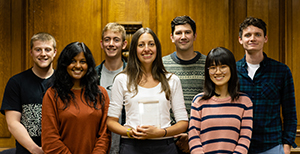LVV Co-Director Prof. Lizzy Cross Wins Outstanding Contribution Award

Prof. Elizabeth Cross, Co-Director of the LVV and a senior lecturer at the Department of Mechanical Engineering, has been awarded the prestigious Achenbach Medal for 2019, in recognition of her outstanding contribution to the advancement of Structural Health Monitoring (SHM).
The international award receives nominations from all over the world and is given to an individual who has been awarded their PhD within the last ten years. The medal is given in honour of its namesake, Jan Achenbach, professor emeritus (Walter P. Murphy Professor and Distinguished McCormick School Professor) at Northwestern University in the USA.
Prof. Cross was presented with this year’s award at the International Conference for Structural Health Monitoring held at Stanford University, in recognition of her work in the SHM field, including her role as the Co-Director and EPSRC Co-Investigator of the Laboratory for Verification and Validation here at the University of Sheffield.
“As an active member of the SHM community, I was very pleased to receive this award. I think it’s a great reflection on the work our team has been doing over the last few years - I’m very grateful for their support. As the first female recipient of this award, I’m hopeful that raising the profile of our work might encourage more women to get involved in the research area”
Prof. Cross’ main research areas span the fields of structural health monitoring (SHM), machine learning and nonlinear system identification. Her specific interests include the development of robust indicators for structural performance and condition and the importation of sophisticated mathematical techniques for use in the discipline of structural dynamics. She currently holds an EPRSC Innovation Fellowship, where she is looking at how to bring together machine learning and physics-based modelling to improve our ability to predict the life-span of critical structures in operation.
Most of her research projects focus on the analysis of large datasets from monitored structures, where she employs data-driven algorithms to extract useful information. For SHM, these efforts attempt to address the problem of confounding influences – where benign changes in the measurements of structural parameters caused by the environment mask the detectability of damage.
Congratulations Lizzy!



